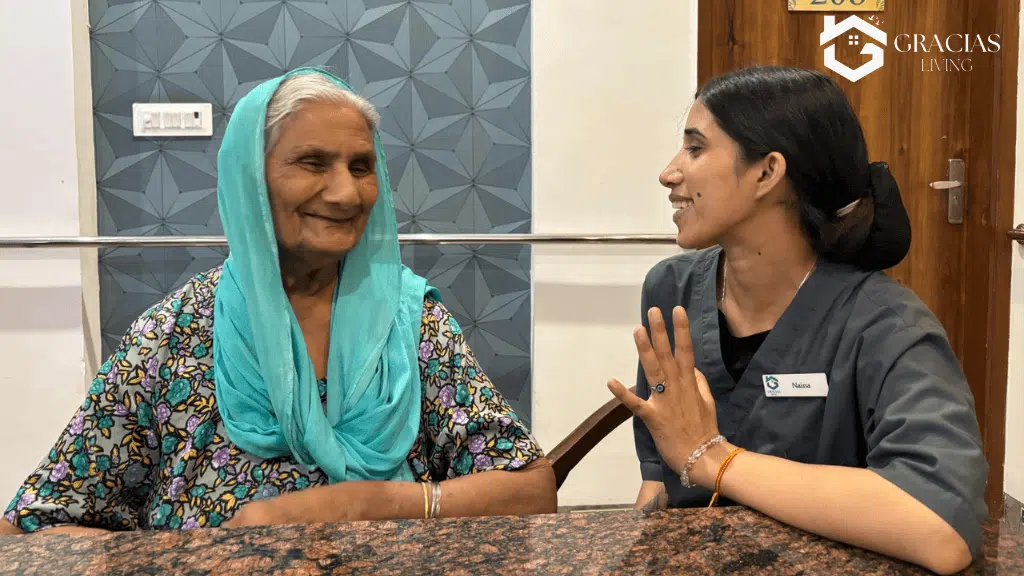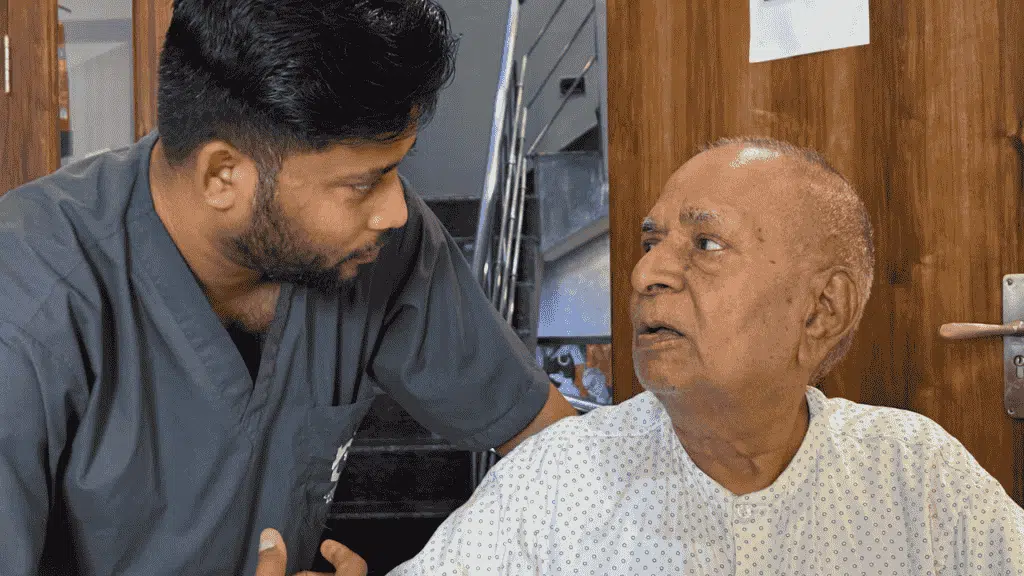Perhaps nothing is more challenging for a family to face than a diagnosis of dementia in a loved one.
When the disease advances, an important question is inevitably asked: How do we provide me with the very best care — and how much will that be? For many families, keeping a loved family member at home in their familiar environment is the most unbearable and comforting solution.
However, the economics of that option are complicated to track. From hourly caregiving to medical and safety expenses, the costs of dementia are a large figure.
This full guide will discuss the various aspects of in-home dementia care expenses, educate and enable you to understand what to do so that you can make an intelligent choice for your family.

The Cost of Dementia Care in India
As part of exploring in-home dementia care in India, families should be aware that home care can significantly differ and is based on several variables like city, the level of required care and unique services provided. There isn’t a one-size-fits-all estimate: home assistance can differ, providing a rough estimate.
Monthly and Annual Averages
Based on prevailing market rates and services, the monthly cost per individual with dementia for Indian professional home care services also runs around ₹50,000 – ₹75,000.
The figure can reach astronomical figures for round-the-clock, 24/7 care.
- Monthly Expense: ₹50,000 to ₹75,000
- Average Annual Fees: INR 6,00,000 to 9,00,000
Remember that these are all estimates and do not include extras such as medication, medical consultations, specialised therapies (eg speech and physiotherapy) or home adaptations.
Families need to factor these in as part of the budgeting process in an attempt to appreciate the total financial commitment.
What Families Can Expect from In-home Dementia Care
There are numerous benefits to in-home dementia care, but none more satisfying than having the ability to care for one’s own distinct and evolving needs.
Caregivers trained in dementia care can provide a range of services to keep the patient safe and comfortable in their own home.

Personal Care and Daily Living Support
This is the basis for home care services for an individual with dementia. It may become increasingly difficult over time for the person with the disease to perform housework.
Caregivers can help with:
Bathing and Hygiene: Safely and respectfully assisting with cleanliness.
Dressing: Helping with choosing proper clothing and dress.
Nutrition: Meal planning and eating assistance to provide adequate oral intake of food and fluid.
Health Checkup at Home, Hospital and Rehabilitation on 40
Home care is often not medical in scope, though some agencies provide trained nurses or caregivers.
This is particularly true for patients who require:
Take Medication: Ensure medication(s) are taken on time.
Vitals Checks: Daily monitoring of blood pressure, blood sugar and other vital health numbers.
Wound Care or Other Medical Needs: Providing specified medical services as directed by a doctor.
Supervision and Safety Monitoring, Behaviour Support
Part of the difficulty in the care of persons with dementia is protecting them from harm, for they tend to wander away or are more likely to have accidents when they lose their memories and get confused.
Carers have been trained to provide constant intimate supervision and to provide behavioural support.
Observation Safety: The more prevalent risks that are located within one’s home.
Behavioural Support: De-escalation and distraction methods for agitation, distress or other behaviour issues.
Companionship: Providing social and mental stimulation, which is vital for slowing the deterioration of cognitive function.

Variables that Influence the Costs of Dementia Care
The costs of dementia care at home are not standardised. It is directly proportional to the extent of care a patient needs.
“The later stage your disease is, and the more intense care you get, the more expensive it becomes”
Level of Dementia Care
The amount of time the caregiver spends with the patient is a primary factor in pricing. These might be broken down into three primary categories:
Part-time In-Home Dementia Care
This is typically best for individuals with early-stage dementia who still remain capable of taking care of themselves to a great extent, but require assistance with some things or prefer to have someone sit with them at home a few hours a day. Prices are typically figured by the hour.
- Price segment: Cost Range: ₹500 to ₹1,000 for an hour, even fixed monthly amount for a specific set of hours.
Full-time In-Home Dementia Care
Full-time care is necessary when the need of the patient increases. This generally involves an 8-12-hour shift per workday. Bathing and dressing, meals and daytime safety are provided by the caregivers.
- Cost: this is on the basis of the number of hours and services rendered as between ₹35,000 -₹ 60,000 monthly
24-hour In-Home Dementia Care
The most intense type of in-home dementia care is essential for patients with severe dementia who should never be left alone, and ideally, it extends into the overnight hours. This often involves a caregiver team that can take turns relieving one another in shifts.
- Cost: ₹60,000 – ₹90,000+ per month and possibly even higher based on the city and agency.
In-Home Care Vs. Care Homes:
The decision between at home care and relocation to a specialised Memory Care or Assisted Living facility is a significant one that has direct implications for money as well as feelings.
Direct Cost Comparison
Comparison in terms of details can be complex, but for a general idea, observe that however the dispatches get transformed in India.
| Home Care | Assisted Living | Memory Care |
| ₹50,000 to upwards of ₹90,000 a month for full-time or round-the-clock help | Monthly rent for such houses for seniors can start at ₹95,000 to more than ₹1,30,000 per month | Memory care facility can vary between ₹1,10,000 to more than ₹1,65,000 per month |
Advantages and Disadvantages for Patients and Families
Advantages: Allows the patient to remain in familiar surroundings with comforting familiarities. So-called restorative care offers one-on-one, individualised care, and can be less costly in the earliest stages of dementia.
Disadvantages: It may socially isolate the patient, and caregiving administration can cause burnout on the part of family members. Costs for 24-hour care can exceed those of a specialised residence.
Assisted Living and Memory Care
Advantages: Organised, secure and community-oriented. All staff members, including nursing assistants and activities directors, work around the clock. Everything (dining, activities, medical care) is paid for in one monthly rate.
Disadvantages: The transition is traumatic for the patient, who can become confused or feel abandoned.
While comprehensive care is normally less expensive, the money you pay upfront that could never be returned or customised care may not be worth it.
When Is the Time Right for a Person with Dementia to Enter a Care Home?
That’s a very tough and personal question. Putting a loved one into a care home should be a decision based on safety, the quality of life for the patient or caregiver, and whether you can provide for the patient at home.
Some of the signs that a care home might be the way to go for you are:
Safety Issues: The person roams or attempts to exit the home, or is in a dangerous state and the caregiver is unable to manage it.
Physical: The patient requires a great deal of help with transfers, toileting, or the patient has extreme medical complexity requiring skilled professional 24-hour nursing care.
Caregiver Burnout: Since the primary caregiver is getting drained and exhausted, they might end up compromising their own health, along with the quality of care.
Disruptive Behaviours: The patient with dementia may become aggressive, paranoid or hallucinates to him/herself and/or others.

When the Dementia Patient Refuses to Move Into a Home
People with dementia usually do not want to go and live in a new place. This rejection of the truth is often rooted in fear, disorientation and a desire to remain in control. When this happens, be patient and caring.
Stick with the familiar: Not “You’re moving,” but “We found a place where you’ll have friends and things to do.”
Get them involved: If your parents are able, have them go visit several facilities and choose a room — even an illogical one.
Start with a test stay: Some nursing homes offer respite care, which allows the patient to get a feeling for what it would be like to live there.
Listen and agree: Their feelings are valid. Acknowledge that you understand they’re scared or frustrated without arguing with them or trying to explain things.
Get pro advice: Talk to a doctor or therapist in order to get tips for an easier transition.
Best Dementia Care Homes in India
Selecting the best dementia care homes in India is not just about a mere search. It’s a matter of finding a place that feels like home and offers high-quality, compassionate, professional care.
When evaluating options, look for:
Specialised Care: A safe and secure memory care unit with dementia-trained staff.
Licensing and Certification: Make sure the facility is licensed and has a good reputation.
Staffing: Ensure an adequate staff-to-patient ratio to ensure your loved one is well cared for.
Stimulate Activities: There must be an activity list that is specifically tailored to stimulate cognitive resources and enable socialisation.
Safety and Security: The facility needs to be a lockdown facility with fall-proofing and emergency management-trained staff.
Transparency: A quality home will be transparent about its policies, fees and lines of communication with families.
Credit: A clean, bright room in an assisted living residence.
Conclusion
The money involved in dementia care, especially in-home services, is also a significant factor to consider for families.
While having a loved one stay at home comes with an unbelievable emotional cost, it requires thoughtful financial planning and information on what’s available.
By weighing the pros and cons between home care or a specialised facility, based on their loved one’s situation — family members who care can make a considerate decision.
Whatever your method is to your new role, the point is really to work towards thriving, safety and dignity for those in need of your care.
Frequently Asked Questions
1. Is in-home care for dementia patients reimbursed by Medicare?
Medicare was an insurance scheme for health offered by the US. There is no direct equivalent in India. While some private health insurance policies might cover part of long-term care, government packages are not typically offered for comprehensive in-home treatment of dementia.
2. How do I provide care to a parent with dementia in the home?
Make routines as routine, predictable and safe as possible.Simple tasks Speak simply and calmly. Access professional caregiver assistance for break and behaviour-management assistance.
3. Can dementia be cured if it’s diagnosed early?
Most types of dementia are currently incurable. But the sooner it’s diagnosed, the sooner treatments and lifestyle modifications designed to suppress symptoms, slow mental deterioration, and enhance quality of life for the patient — and the family — can start.
4. What is home care for elderly with dementia?
Extremely high-quality individualised care, provided by a trained caretaker, in the very comfort of an elderly person’s own home. Services provided are assistance with activities of daily living, management, safety checks and companionship.
5. What is the rough average of home dementia care expenses?
In India, average monthly expenditure for home-based dementia care can range from ₹50,000 in the case of full-time to more than ₹90,000 a month if it’s 24/7 help. This doesn’t even include health care and other.
